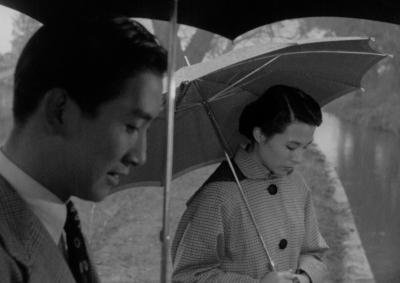The Moon Has Risen
Tsuki wa noborinu, Japan, 1955
Rarely mentioned in English-language texts on classic Japanese cinema—outside of her outsized role as an actress in the early films of Yasujirō Ozu and 15 pictures by Kenji Mizoguchi—Kinuyo Tanaka (1909-1977) starred in over 250 films during her five-decade career and went on to direct six features, making her the second Japanese woman ever to make feature films in Japan. One of her most celebrated, The Moon Has Risen, was co-written by Ozu, for whom Tanaka acted in no fewer than 10 films, including a starring role in the gangster gendai geki, Dragnet Girl (1933). Tanaka is seen on screen here as a house laborer for the Asai family, whose patriarch, Ozu regular Chishû Ryû, patiently oversees the romantic ventures of his three daughters over a leisurely late autumn in their town of Nara, which stood as Japan’s capital during the 8th century and provides some of the stunning locations for the film’s many dreamy rendezvous. The perfect gateway into Tanaka’s brief yet impressive directorial career.
DCP, b&w, in Japanese with English subtitles, 103 min. Director: Kinuyo Tanaka. Screenwriter: Yasujirō Ozu, Ryosuke Saito. Cinematographer: Shigeyoshi Mine. Editor: Mitsuo Kondô. With: Chishû Ryû, Yôko Sugi, Mie Kitahara. DCP courtesy of Janus Films.
Lover Letter
Koibumi, Japan, 1953
With Kinuyo Tanaka’s first feature, released one year after American occupation of the country ended, she made history as the second Japanese woman ever to direct a feature film in Japan. Made with the support of the Shintoho film studio and screened at the 1954 Cannes Film Festival, her first foray behind the camera was supported by collaborators Mikio Naruse and Yasujiō Ozu but opposed by longtime collaborator Kenji Mizoguchi, who blocked her application with the Directors Guild of Japan, claiming that Tanaka “does not have enough brains to be a film director.”
Adapted from Fumio Niwa’s novel, this post-war should-be classic explores the professional and personal conflicts of Reikichi (Masayuki Mori), a repatriated veteran who searches for his lost love Michiko (Yoshiko Kuga) while translating romantic letters from Japanese women to American GIs. With incisive complexity, Love Letter depicts the fraught adaptation of Japanese soldiers to a changed society as well as the moral condemnation of Japanese women who entered into relations with the enemy.
DCP, b&w, in Japanese with English subtitles, 98 min. Director: Kinuyo Tanaka. Screenwriter: Keisuke Kinoshita. Adapted from a novel by Fumio Niwa. Cinematographer: Hiroshi Suzuki. Editor: Toshio Gotô. With: Masayuki Mori, Yoshiko Kuga, Jûkichi Uno. DCP courtesy of Janus Films.
Special thanks to our community partner: UCLA International Institute






 Mobile Navigation
Mobile Navigation

